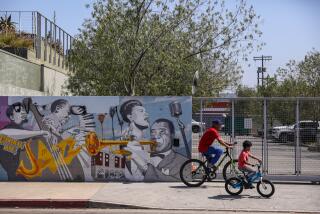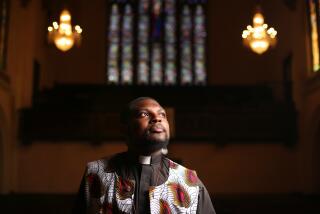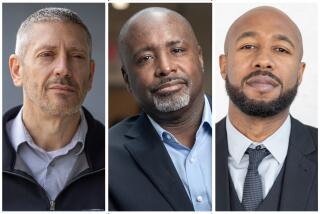4 candidates for mayor debate in South L.A.
The four candidates for mayor sat in the pews at a historic black church in South Los Angeles on Saturday morning, their heads bowed in prayer.
They had come to Brookins Community AME Church to debate a range of issues — from how to shrink the area’s high unemployment rate to whether the new Crenshaw Line should be partially below ground. At stake was a slice of the city’s significant African American electorate, which in local elections typically makes up about 13% of the vote.
After the Rev. C. Dennis Williams finished his invocation, the candidates introduced themselves to the audience, each stressing their connections to the community.
City Controller Wendy Greuel evoked the memory of Tom Bradley, the city’s first and only black mayor. Greuel said she was a 17-year-old who figured she would one day take over her family’s hardware store when she was nominated for one of Bradley’s leadership awards and decided to pursue a career in public service instead. “I met Tom Bradley and was inspired,” she said.
Councilman Eric Garcetti quoted from the Bible (“Without vision, the people shall perish”) and talked at length about his grandfather, who owned a barbershop at Vermont Avenue and Washington Boulevard. “I am the product of a small business here in South L.A.,” Garcetti said.
Former federal prosecutor Kevin James talked about his role on the board of AIDS Project Los Angeles and the nonprofit’s decision in the 1990s to sell its headquarters in Hollywood and open satellite clinics in minority communities, including in Baldwin Hills.
The only black candidate on hand for the debate, City Councilwoman Jan Perry, recalled growing up the daughter of two civil rights activists in Ohio. She talked about bringing affordable housing and new grocery stores to her district, which takes in much of South L.A., and vowed to return the middle class dream to the area if she is elected mayor next year.
The church was only about half full, with campaign workers nearly outnumbering members of the public. But many in the audience submitted questions for the candidates, with several focusing on the fate of the Crenshaw Line, an 8.5-mile rail line that will run along Crenshaw Boulevard and terminate near Los Angeles International Airport.
The question of whether the line would include a stop in Leimert Park, considered the cultural heart of black Los Angeles, and whether part of the track would be built underground, “is the make-or-break issue for African Americans,” said Anthony Samad, who was live-tweeting the debate from the church. Each of the candidates said they supported a Leimert stop. Greuel and James said they would fight for an underground track for the entire stretch that community activists are calling for, with Garcetti and Perry saying their support would depend on what was feasible.
Samad, a professor of political science at East Los Angeles College, said many black voters were disappointed that city and county transportation officials haven’t committed to paying for the extra stop and the underground track. He said voters felt “exploited” by Mayor Antonio Villaraigosa, who won election in 2005 with the help of the black vote but who Samad said has place a priority on another transit project: the Westside subway extension known as the “Subway to the Sea.”
“He hasn’t delivered any real substantive change in our community,” said Samad, who credited former Police Chief William J. Bratton and not Villaraigosa with helping to bring about historically low crime rates, even though Villaraigosa has made police hiring a priority.
Frustration with the mayor flared up in another question, this one posed by a moderator who asked candidates whether they would commit to hiring African American staff members. The moderator said that Villaraigosa has no black officials in the top echelons of his administration, a point that Villaraigosa aide Teddy Davis later corrected, pointing out that Villaraigosa’s deputy mayor for budget and finance is an African American woman.
More to Read
Start your day right
Sign up for Essential California for news, features and recommendations from the L.A. Times and beyond in your inbox six days a week.
You may occasionally receive promotional content from the Los Angeles Times.







